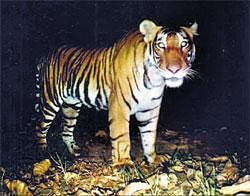
The tiger had hit the headlines for travelling a record 280 km from Bandipur to Esoor (Gama) village in Shikaripur.
But the animal has been found dead three months after being captured, radio-tagged and released back into the wilderness in May. Its death has been attributed to a territorial feud with a fellow tiger.
B K Singh, Principal Chief Conservator of Forests - who confirmed the tiger’s death in Mutthodi last week - said the post-mortem had revealed that it had died after suffering serious injuries in a territorial fight.
“The tiger suffered multiple fractures on both its forelegs and hind legs. It also sustained claw and canine injuries on the neck and other parts of the body. During the fight, both the animals have rubbed against each other. Since the ground is wet due to monsoon, we could see a lot of pug marks,” he explained. He said the post-mortem report had revealed that the tiger was healthy and able to hunt before it died.
A wildlife expert confirmed that the dead animal had been matched with the picture of the one released into the wild.
Top wildlife biologists confirmed that it was the same three-year-old tiger that had perplexed scientists by travelling 280 km from Bandipur and had strayed into Esoor village.
The animal killed one person and injured two before it was captured and released back into the forest following consultation with senior scientists of the Wildlife Conservation Society.
The tiger was released at Hipla Hadlu in Bhadra reserve on May 7, 2011, by Ramesh, who is said to have voluntarily come to Bhadra to release it.
WCS scientists compared the stripe patterns of the animal by photo-matching it with their database of tiger pictures and confirmed that the beast was BPT-241, which was last camera-trapped in Gundre area of Bandipur Tiger Reserve on February 11 and 18, 2010.
The database of tiger pictures has been the result of the Society’s two-decade research initiative.
A GIS map showed that the “straight line” distance travelled by the tiger from Bandipur to Shikaripur was about 280 km, which the animal had covered since it was captured on camera. However, it could have taken a far more round about route.
This was considered one of the longest scientifically recorded dispersals of a wild tiger in the world, based purely on the camera-trapping data. WCS scientists were intensively camera-trapping the Bhadra area in the hope that the animal would settle down there.